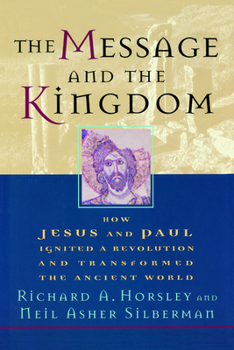The Message and the Kingdom: How Jesus & Paul Ignited a Revolution & Transformed the Ancient World
Select Format
Select Condition 
Book Overview
Set against the backdrop of Roman imperial history, The Message and the Kingdom demonstrates how the quest for the kingdom of God by Jesus, Paul, and the earliest churches should be understood as both a spiritual journey and a political response to the "mindless acts of violence, inequality, and injustice that characterized the kings of men." Horsley and Silberman reveal how the message of Jesus and Paul was profoundly shaped by the history of their...
Format:Paperback
Language:English
ISBN:0800634675
ISBN13:9780800634674
Release Date:January 2002
Publisher:Fortress Press
Length:304 Pages
Weight:1.10 lbs.
Dimensions:0.8" x 5.9" x 8.9"
Related Subjects
Ancient Christian Books & Bibles Christianity Church History Cultural Education Education & Reference History History of Religion Inspirational Judaism Politics & Social Sciences Reference Religion Religion & Spirituality Religious Studies Social Science Social Sciences SpiritualityCustomer Reviews
3 ratings
Distinguishing the forest from the trees....
Published by Thriftbooks.com User , 17 years ago
Horsley's book here reads more like a narrative social history. There aren't footnotes and citations, no minutia to contend with, which for an academic guy, is pretty good. The thing that I liked most about the book was that he pointed out what are apparent tensions within the text of the New Testament -- not in a bitter way like some liberal scholars (cough, cough, "Bart Ehrman," cough, cough) who lost their faith and are now angry that they feel duped -- but in a way that was tactful and thoughtful. Was Paul, the hero and main interpreter of Jesus of Nazareth (by the inclusion of so much of his writing into the New Testament, including that which probably isn't his but a disciple of his) really rejected by the Jerusalem community? It kind of sounds that way in Horsley's story. If Galatians (which is considered authentically Paul)is written in 48/9 C.E. and Paul's mission to the Gentiles hasn't really been clarified to the Jerusalem council, then some of Paul's letters in Corinthians and the subsequent attack on "Judaizers" makes sense. The Jerusalem community wasn't buying what Paul was selling -- pagans may become God-fearers (sons of Noah abiding by Noachide laws see Acts 15) but if they want in they should go all the way and convert. They are welcome to sojourn, but that doesn't make the gentiles converts. Paul disputes this -- Torah observance isn't necessary. James says he's wrong. Israel is defined by its relationship to Torah that was given by God -- and affirmed by Jesus. Paul's basis for his gospel? Personal revelation. That is where it gets sketchy. Overall a good read and thought provoking. I'd recommend it, though it probably isn't for some younger undergrads.
Finally!
Published by Thriftbooks.com User , 22 years ago
Professor Horsley has repeatedly offered us books impeccably researched and annotated in great detail. Yet despite the promise of those works, Horsley has too often hidden his gifts behind an impenetrable wall of technicalities and minutia. In his attempts to demonstrate his intelligence, Horsley has sometimes made his writing obtuse and inaccessible to the average reader.This, however, is not one of his failures. Here Horsley finally gets it right. Here Horsley fulfills the promise of his other works.Examining the politics, sociology, psychology and religion of the renewal movements founded by John the Baptist, Jesus of Nazareth, and Paul of Tarsus, Horsley and Silberman weave an exhilarating narrative that exposes the historical roots of Christianity. Thoroughly comprehendible by the lay reader, without sacrificing scholarship, this book demonstrates that the authors can strike an appropriate balance between academia and popular reading.
Social Reform
Published by Thriftbooks.com User , 24 years ago
Harsley and Silberman provide a social and economic setting of the time of Jesus and Paul (10 BCE - 70 CE) and the "Jesus Movement". Without addressing the religious truth of Christianity, they describe its social context and the impact it had on Palestine and the eastern Mediterranean.The authors draw on recent archaeological finds to present a picture of life during this time. Along with the Bible and writings of Josephus, they use non-canonical early Christian writings, and Roman documents and inscriptions.Bibliographical Notes in addition to the Bibliography make it easy to refer to more original sources in topics of interest.The book is somehat hard to read, visually. This edition uses a very light serif font, and the paragraphs are rather long. Some familiarity with Biblical accounts of Jesus and Paul would be helpful for the reader.






